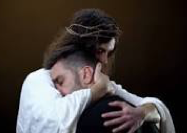There’s a story told of a young Jewish boy named Mortakai who refused to go to school.
When he was six years old, his mother took him to school, but he cried and protested all the way and, immediately after she left, he ran back home. She brought him back to school and this scenario played itself out for several days. He refused to stay in school.
His parents tried to reason with him, arguing that he, like all children, must now go to school. To no avail. His parents then tried the age-old trick of applying an appropriate combination of bribes and threats. This too had no effect.
Finally, in desperation they went to their Rabbi and explained the situation to him. For his part, the Rabbi simply said: “If the boy won’t listen to words, bring him to me.” They brought him into the Rabbi’s study. The Rabbi said not a word.
He simply picked up the boy and held him to his heart for a long time. Then, still without a word, he set him down. What words couldn’t accomplish, a silent embrace did. Mortakai not only began willingly to go to school, he went on to become a great scholar and a Rabbi.
What that parable wonderfully expresses is how the Eucharist works. In it, God physically embraces us. Indeed that is what all sacraments are, God’s physical embrace. Words, as we know, have a relative power. In critical situations they often fail us.
When this happens, we have still another language, the language of ritual. The most ancient and primal ritual of all is the ritual of physical embrace. It can say and do what words cannot.
Jesus acted on this. For most of his ministry, he used words. Through words, he tried to bring us God’s consolation, challenge, and strength. His words, like all words, had a certain power. Indeed, his words stirred hearts, healed people, and affected conversions. But at a time, powerful though they were, they too became inadequate. Something more was needed.
So on the night before he died, having exhausted what he could do with words, Jesus went beyond them. He gave us the Eucharist, his physical embrace, his kiss, a ritual within which he holds us to his heart.
Thanks to Fr. Ronald Rolheiser, O.M.I. for these words.
Jesus holds us to his heart through the Eucharist on this Feast of the Body and Blood of Jesus (Luke 9:11b-17).
This is what our fathers do when they hug us, kiss us and hold us to their hearts. Today we celebrate all of our fathers, both living and departed. HAPPY FATHER’S DAY, DAD!!
Hold someone to YOUR heart today in a special way!
INSIDE ME IS A WEAK HEART, BUT BEHIND IT, IS A VERY, VERY STRONG GOD!!






